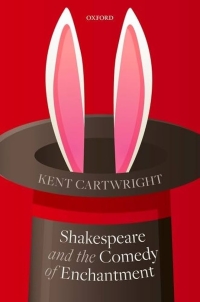Kent Cartwright

Research Expertise
Early Modern Studies
Poetics
My field of study is medieval and Renaissance literature, especially drama, Shakespeare, and sixteenth-century literature. I am at present an emeritus professor. When I was teaching, I held appointments as an affiliate professor Theater and an affiliate professor Classics in addition to my appointment in English. My scholarship has largely taken up questions of how and to what effect literature moves us, an interest as much formal as historical.
My third and most recent book, Shakespeare and the Comedy of Enchantment (Oxford University Press, 2021) argues that Shakespeare's comedies orchestrate ongoing encounters between the rational and the mysterious, with the audience’s responses orchestrated by devices, themes, and tropes that arouse a sense of experiences and that lend finally an extra-rational dimension to the theatrical experience. My second book, Theatre and Humanism: English Drama in the Sixteenth Century (Cambridge University Press, 1999), studies the hundred years of drama before Shakespeare, analyzing the transformation of an allegorical, didactic, and religious drama at the beginning of the period into a theater at the end of the century criticized as emotional, fantasy-arousing, and even immoral. My first book (Shakespearean Tragedy and Its Double: The Rhythms of Audience Response (Penn State University Press, 1991) focuses on techniques of “engagement” and “detachment” employed by Shakespeare to elicit emotional and intellectual responses from audiences.
I am currently at work on what I hope will be a book-length study of theories of literary reading that emerged after the First World War, especially the work of I. A. Richards, often considered the founder of modern literary study. The project is tentatively entitled “Reading After the War.”
Besides those monographs, a major project was my edition of Shakespeare’s The Comedy of Errors (Bloomsbury, 2017) for the prestigious Arden Shakespeare, Third Series texts. In addition, I have edited, among other works, A Companion to Tudor Literature (Blackwell, 2011), a compendium of original essays from an international group of scholars that explore aspects of Tudor literature, with particular attention to its relationship to medieval culture.
My career has involved a considerable amount of administrative and leadership work. I have served as chair of the University of Maryland Senate, chair of the Department of English for six years, trustee of the Shakespeare Association of America, and president of the national Association of Departments of English. Because of my professional service, my scholarly interests have come to include large disciplinary questions about the social and personal value of reading literature.
Besides teaching at Maryland, I have enjoyed short-term visiting professorships at the University of Szeged (Hungary) and the University of Florence (Italy). In 2013-14 and again from 2016-2022, I was a Visiting Researcher at Ca’ Foscari University of Venice. I was also appointed a Visiting Researcher at the University of Pisa (March 2020).
Publications
The book takes exception to the modernist vision of a deterministic 'disenchanted' world. As action in Shakespeare's comedies advances, various kinds of mysteries accrue, all of whose numinous effects linger after reason has apparently answered the play's questions.
The Comedy of Errors
Shakespeare's dextrous comedy of two twin masters and two twin servants continually mistaken for one another is both farce and more than farce.
Author/Lead: Kent CartwrightShakespeare's dextrous comedy of two twin masters and two twin servants continually mistaken for one another is both farce and more than farce. The Comedy of Errorsexamines the interplay between personal and commercial relationships, and the breakdown of social order that follows the disruption of identity. As well as detailed on-page commentary notes, this new edition has a long, illustrated introduction exploring the play's performance and crtitical history, as well as its place in the comic tradition from Classical to modern times.
A Companion to Tudor Literature
The volume (536 pp.) contains 31 original essays by established and emerging scholars, with equal attention given to the early Tudor and the Elizabethan aspects of sixteenth-century literature.
Author/Lead: Kent CartwrightThe volume (536 pp.) contains 31 original essays by established and emerging scholars, with equal attention given to the early Tudor and the Elizabethan aspects of sixteenth-century literature. The volume features contributions from several members of the department: an essay by Theresa Coletti and Gail McMurray Gibson (Davidson College) on "The Tudor Origins of Medieval Drama"; an essay by Kimberly Anne Coles on "West of England: The Irish Spectre in Tamburlaine"; and a Tudor chronology compiled by Kathleen Bossert. This volume presents students with a valuable historical and cultural context to the period. The Companion discusses key texts and representative subjects, and explores issues including international influences, religious change, travel and New World discoveries, women's writing, technological innovations, medievalism, print culture, and developments in music and in modes of seeing and reading.
Shakespearean Tragedy and Its Double: The Rhythms of Audience Response
Shakespearean Tragedy and Its Double analyzes the development of the tragic audience as it oscillates between a consciousness of its own comparative judgments, its doubts, and of acting and theatricality.
Author/Lead: Kent CartwrightShakespearean Tragedy and Its Double investigates the poetics of audience response. Approaching tragedy through the rhythms of spectatorial engagement and detachment ("aesthetic distance"), Kent Cartwright provides a performance-oriented and phenomenological perspective. Shakespearean Tragedy and Its Double analyzes the development of the tragic audience as it oscillates between engagement—an immersion in narrative, character, and physical action—and detachment—a consciousness of its own comparative judgments, its doubts, and of acting and theatricality. Cartwright contends that the spectator emerges as a character implied and acted upon by the play. He supports his theory with close readings of individual plays from the perspective of a particular element of spectatorial response: the carnivalesque qualities of Romeo and Juliet; the rhythm of similitude, displacement, and wonder in the audience's relationships to Hamlet; aesthetic distance as scenic structure in Othello; the influence of secondary characters and ensemble acting on the Quarto King Lear; and spectatorship as action itself in Antony and Cleopatra.
Read More about Shakespearean Tragedy and Its Double: The Rhythms of Audience Response
Theatre and Humanism: English Drama in the Sixteenth Century
English drama at the beginning of the sixteenth century was allegorical, didactic and moralistic; but by the end of the century theatre was
censured as emotional and even immoral.
Author/Lead:
Kent Cartwright
English drama at the beginning of the sixteenth century was allegorical, didactic and moralistic; but by the end of the century theatre was censured as emotional and even immoral. How could such a change occur? Cartwright suggests that some theories of early Renaissance theatre - particularly the theory that Elizabethan plays are best seen in the tradition of morality drama - need to be reconsidered. He proposes instead that humanist drama of the sixteenth century is theatrically exciting - rather than literary, elitist and dull as it has often been seen - and socially significant, and he attempts to integrate popular and humanist values rather than setting them against each other. Taking as examples the plays of Marlowe, Heywood, Lyly and Greene, as well as many by lesser-known dramatists, the book demonstrates the contribution of humanist drama to the theatrical vitality of the sixteenth century.
Read More about Theatre and Humanism: English Drama in the Sixteenth Century


